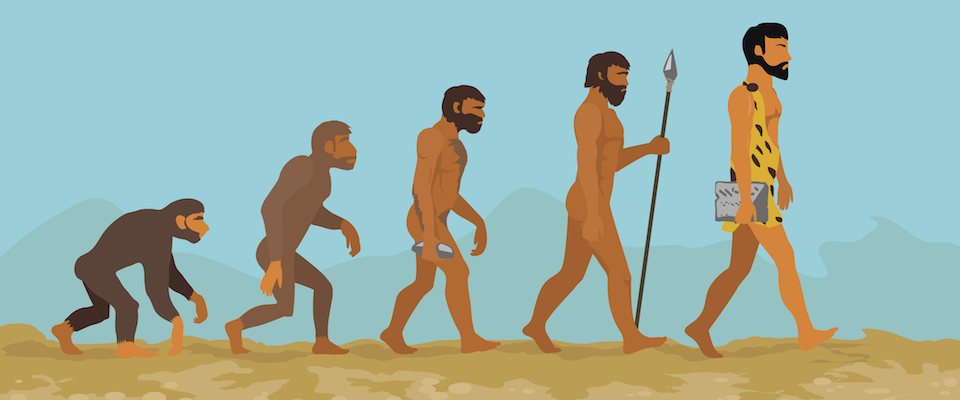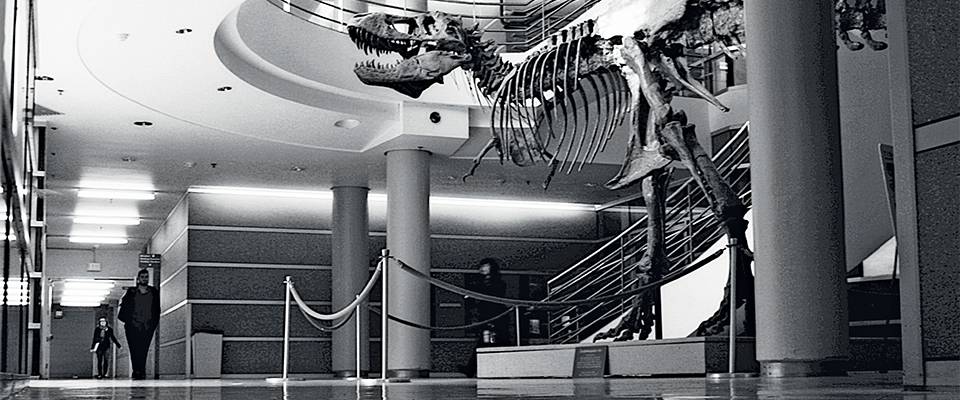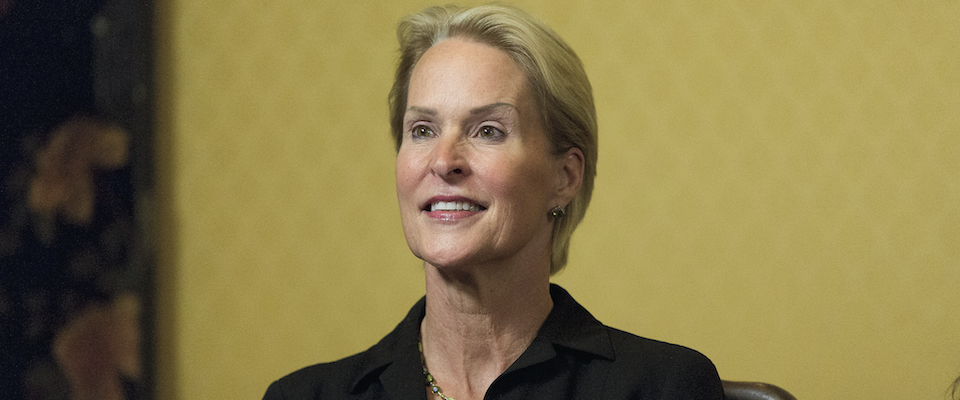Everything you ever wanted to know about evolution (but were too afraid to ask).
No issue of a magazine devoted to the theme of Adaptation would be complete without some attention paid to biological evolution, à la Charles Darwin. To learn more about the subject we turned to Anna Thanukos, M.A. ’00, Ph.D. ’02, principal editor of Understanding Evolution, a free Web resource produced by the University of California Museum of Paleontology.
Originally built with funding from the National Science Foundation and the Howard Hughes Medical Institute, the site gets 23 million page views per year. Thanukos, whose Berkeley degrees are in integrative biology and science education, gamely agreed to field our questions, no matter how dumb, and provide intelligent, no-nonsense answers. When asked what she most wanted readers to know about the Understanding Evolution website, she responded, “The URL.”
So, here you go: UnderstandingEvolution.org.
CALIFORNIA MAGAZINE: Darwin’s theory has always been controversial and even now, many people cannot accept that we are descended from apes. But it’s actually much worse than that, isn’t it? Ultimately, aren’t we descended from germs?
ANNA THANUKOS: Sure, but I think you aren’t giving germs the credit they’re due! Microorganisms do amazing things like transform stinking sulfur into food, turn barley into beer, and glow in the dark. They’ve invaded every possible niche on Earth. They evolve lightning-fast. Once we’ve forced ourselves into extinction, germs will still be going strong. I, for one, am proud to be descended from a long line of noble, innovative germs.
A common expression is “evolve or die.” How does one go about evolving? And does evolving really forestall death?
The great thing about biological evolution is that you don’t have to try at all. It just happens inevitably. Like it or not. That was Darwin’s great insight. Any time that you have organisms with different characteristics living, reproducing, passing on their genes, and dying, you are going to have evolution. That evolution might be shaping a lineage adaptively through natural selection, or it might just be small, random changes that happen through mutation and the vagaries of reproduction. Either way, the lineage is evolving. So, does evolution forestall death? Sorry, but no. Evolution by natural selection is all about producing more healthy, fecund offspring than your neighbor. It has little power to extend your life beyond reproductive age—unless you are doing useful stuff that enhances reproduction, like taking care of your grandkids! If you want to forestall death, look to the National Institutes of Health, not evolution.
How on earth did flight ever evolve? One thinks of early human flight attempts, all those crazy flying contraptions crashing and crumpling, barely getting off the ground. Were there hundreds of thousands of years of failed flight in animals before some bird-like creature finally took to the air and soared?
In fact, no. The mistake that we humans made was that we came at it trying to fly. But evolution has no goals and nothing to do with effort. When the precursors for flight started to evolve in the ancestors of birds (aka dinosaurs) and of other flying organisms, there was no trying and failing to fly; there was only succeeding at something different. For example, the earliest feathers in dinosaurs were little more than downy fuzz. We can’t be certain exactly why this trait was favored when it arose, but it likely served some function that had nothing to do with flight, like providing insulation. Later, other variants on these downy feathers appeared that happened to be useful for something else—making a colorful display to attract mates, perhaps. Other variants may have been found useful for gliding, or when combined with arm flapping, for gaining traction when running uphill. Natural selection has no foresight or goals. It keeps around traits that are furthering organisms’ survival and reproduction today, not traits that might come in handy a million years from now. In this way, evolution is kind of zen. No striving, no trying. Just using what happens to be useful. So the precursors for flight (whether in birds, bats, insects, or pterosaurs) were favored for reasons other than flight and were later co-opted by evolution for this function. Of course, once these traits began to aid survival by allowing flight, natural selection began to optimize them for this function, too.
Are humans still evolving or have we hijacked the whole process with technologies like antibiotics, vaccines, in vitro fertilization, and dating apps?
Both! We’ve hijacked it and we are still evolving. But that’s actually nothing new. We’ve been hijacking our own evolution as long as we’ve been developing tools. Controlling fire, for example, allowed us to cook our food, which seems to have favored certain traits in our gut. Some human populations domesticated cattle, and suddenly, being able to digest lactose as an adult became a valuable trait and spread. And as soon as we started living in large societies, we changed the rules again: Being able to survive diseases like bubonic plague became a lot more important than whether you, personally, could spear an aurochs. Modern technology alters the course of human evolution, yes. But so did all of our past technological innovations.
Well, we’ve certainly hijacked dog evolution, haven’t we? I, for one, refuse to accept that nature would have created a Welsh corgi.
We’ve totally hijacked dog evolution. The example you point to speaks for itself. For even more evidence, look at bulldogs, which usually need to be delivered by C-section because of their huge heads. Without human intervention, something like 80 percent of bulldog moms and pups could die during birth. Since evolutionary fitness is all about being able to successfully reproduce, this breed would never have arisen without our disturbing desire to see dogs fight a bull—the purpose for which the bulldog’s traits were originally artificially selected. I’d feel better about humanity if instead, we could chalk the evolution of this breed up to an inexplicable fondness for wrinkles and pug noses.
Hasn’t domestication benefited dogs as a species though? Just look at the tenuous status of the gray wolf compared to domestic canines. The dogs seem to be far better off than their wild kin.
I guess it depends on how one defines “benefited.” In terms of sheer number of individuals or genes present on Earth, yes, domestication has benefited dogs. If you’re looking at quality of life, you’d probably find people willing to argue either side. Interestingly, by weeding out traits, domestication usually reduces a population’s genetic diversity, which can be bad for the group’s long-term viability. However, dogs are quite variable genetically for a number of reasons, including historical interbreeding with wolves. Gray wolves, on the other hand, have recently suffered large losses of genetic diversity at the hands of humans as their population sizes have been reduced and their habitats fragmented. In this case, dogs’ wild cousins really got the short end of the stick: low genetic variation and no dog biscuits.
According to the idea of survival of the fittest, shouldn’t we all be getting smarter and, well, fitter? Instead, we seem to be no more intelligent than our ancestors and, in some ways, physically inferior—or at least, fatter. What gives?
Ah, fitness. What a tricky word. In our everyday language, “fit” means physically fit, and then, when we apply the term to evolution, we tend to stretch that concept to include mental fitness or intelligence. But in fact, the evolutionary definition of fitness has more to do with matching or fitting the circumstances of one’s life than it does with being able to bench press one’s body weight. Apparently, “survival of the matching-est” just doesn’t have a ring to it. At any rate, an evolutionarily fit organism is one that can survive and reproduce in its environment, and fitter organisms are ones that get more genes than others do into the next generation. When sporting a six-pack is associated with having a boatload of healthy kids, then we’ll see that sort of fitness spread via natural selection.
Incidentally, some genes that increased our evolutionary fitness in the past are probably making us less healthy today. In our Paleolithic ancestors, having a taste for fatty and sweet foods would have been advantageous. When starvation is a real risk, eating high-calorie foods is a good thing, providing a little padding (pun intended) for tougher times ahead. However, when potato chips and donuts lurk in every convenience store, it’s clear where the genetic predisposition for such foods leads: either to the gym or the doctor’s office.
Given that most species that have ever lived on Earth have gone extinct why should we worry so much about extinction as an issue?
Extinction is natural, true. But so are a variety of things we try to prevent for both moral and selfish reasons: mosquito bites, wrinkles, polio. Practically speaking, extinction is a concern because ecosystem dynamics are complex and it’s tough to predict what might happen as we start removing players from that system. Things could tip so far out of balance that the repercussions threaten human wellbeing. Furthermore, when a species is gone, it takes all of its genetic variation with it. That squandered genetic variation almost certainly includes useful things: cures for diseases, enzymes for biofuel production, genes that could make our crops drought resistant, etc. And then of course, from a moral perspective, most of us probably feel a bit guilty that humanity’s impact on the Earth is most akin to that of a massive asteroid striking the planet, setting everything on land on fire, and blotting out the sun for a year. That’s what we are on track to do if we don’t make a U-turn with respect to climate change, land use, and pollution. That would be a pretty sad legacy for Homo sapiens to leave. Aesthetically, I personally feel that a rich, biodiverse Earth is more beautiful than a depauperate one. I want to live on a planet with pink river dolphins, dragon’s-blood trees (Google it!), and bird-eating spiders. I don’t think I’m alone in that preference, though others might go with tigers, elephants, and orchids as their poster species.
What are we to make of so-called living fossils? I’m thinking of, say, horseshoe crabs, certain sharks, or Keith Richards. Does their relatively static form challenge evolution?
Quite the opposite. “Living fossils” merely demonstrate that some combinations of physical traits are consistent winners. Apparently, sharp teeth and cartilaginous skeletons never go out of style. But keep in mind that it’s only the obvious physical traits of these organisms—ones that are easily preserved in fossils—that have stayed constant. More subtly and at a genetic level, they’ve continued to change; Keith Richards excluded, of course. Though, if he’s been experimenting with DNA-altering technology, that might explain a lot.
You use the word moral but much of the resistance to evolution has to do with the seeming indifference of the universe, as Darwin and Wallace described it. What would you say to those who see evolution as a story without any moral?
I’d say that the right place to look for a sense of morality is within one’s own conscience, not in the mechanisms of the natural world. It’s true that evolution doesn’t require there to be any Intelligent Designer running the show. But neither does Brownian motion, plate tectonics, or the refraction of light. These processes just describe how the natural world works. We shouldn’t be looking to them for guidance on matters of morality or faith. (And at this point, I’d like to make a shameless plug for Understanding Evolution’s sister site about the nature of science: UnderstandingScience.org. Check it out.) For those who feel there’s something dispiriting about life evolving through a mechanistic process, I’d say to use your fantastically adapted brain to look a little harder at life’s diversity. It’s amazing out there (and in there, and up there, and down there): living things squeezed into every crevice, nook, and niche. I think Darwin said it best: “There is grandeur in this view of life, with its several powers, having been originally breathed into a few forms or into one; and that, whilst this planet has gone cycling on according to the fixed law of gravity, from so simple a beginning endless forms most beautiful and most wonderful have been, and are being, evolved.” Goosebumps, right?




















